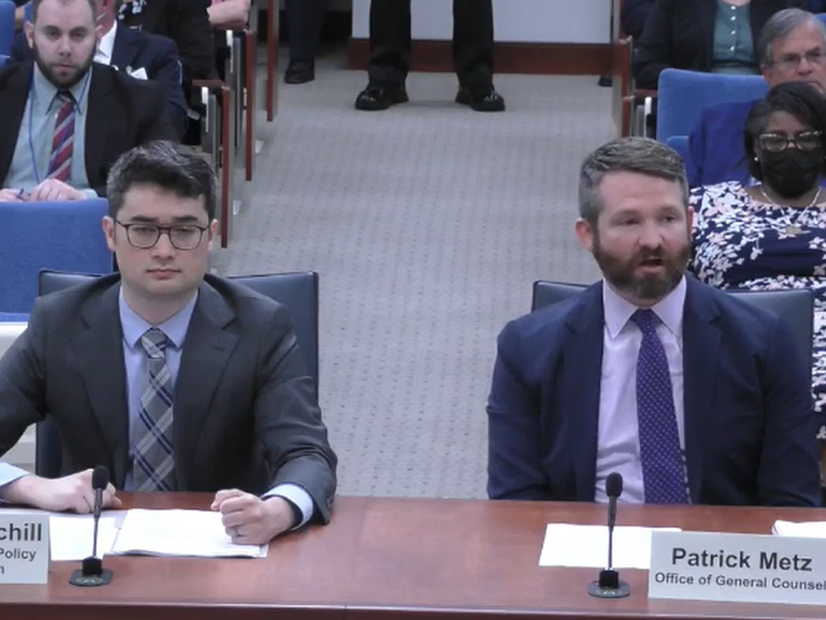
WASHINGTON — FERC on Thursday proposed allowing RTOs and ISOs to share credit-related information about market participants, fulfilling one of the main requests the grid operators made at a technical conference last year (RM22-13).
The Notice of Proposed Rulemaking, approved unanimously at the commission’s monthly open meeting, would require the grid operators to revise their tariffs to eliminate confidentiality provisions that prevent them from sharing such information. They would also be allowed to use received information for the same purposes for which they use information from their own market participants.
Allowing this information sharing “could improve the accuracy of credit exposure and risk assessments across multiple electric power markets,” the commission said in a statement. “It also could enable market operators to respond to credit events more quickly and effectively, thereby minimizing the overall risks of unexpected defaults by market participants.”
At a technical conference in February 2021, RTO credit risk officials told FERC that although they meet monthly with their counterparts to share best practices, confidentiality rules prevent them from sharing market participant-specific information, even if the participant may pose a credit risk in multiple markets. (See RTOs: Let Us Share Trading Info.)
The commission agreed this is a problem.
“Negative credit events affecting a market participant’s credit standing in one market may impact its credit standing in other markets,” FERC said in its proposal. “An RTO/ISO that cannot obtain market participants’ credit-related information arising from their activities in other organized wholesale electric markets may not be able to fully protect its organized wholesale electric market from mutualized default risk.”
The commission also specified that information sharing must not be predicated on a market participant’s prior notice or consent. “A market participant facing financial difficulty would have little incentive to consent to credit-related information sharing,” it said.
Comments on the NOPR are due 60 days after publication in the Federal Register.
Collateral Requirements
The technical conference stemmed from PJM’s debacle with GreenHat Energy, which FERC accused of defrauding the RTO by acquiring a massive 890 million-MWh portfolio of financial transmission rights with only about $550,000 in collateral. When it defaulted on the portfolio in 2018, its three principals made off with $13 million and left PJM members holding a $179 million bag, FERC said in a January lawsuit after the company failed to pay $242 million in fines. (See FERC Levies $242M in Fines on GreenHat, Owners.)
FERC cited GreenHat in a second unanimous order Thursday requiring CAISO, ISO-NE, NYISO and SPP to show cause as to why they shouldn’t revise their tariffs to include provisions ensuring FTR market participants maintain sufficient collateral (EL22-62, et al.).
The commission said that after considering remarks at the technical conference and comments in that docket, it believes “that two specific practices may be particularly critical to effectively managing credit risk for FTRs”: a mark-to-auction mechanism and a volumetric minimum collateral requirement. Three of the grid operators cited in FERC’s order already implement one practice, but not the other; CAISO implements neither.
The first practice requires that participants maintain sufficient collateral to support the change in value of the FTR positions they hold based on the most recent auction prices for those FTRs. The commission noted that GreenHat’s losing positions went unnoticed by PJM because the RTO used historical FTR values. Since the company’s default, PJM — along with ISO-NE, MISO and NYISO — revised their tariffs to implement mark-to-auction mechanisms.
“While CAISO has limited opportunities to update the collateral requirements of [congestion revenue rights], it does not have a robust mark-to-auction FTR collateral requirement similar to what has been adopted recently in other organized wholesale electric markets,” FERC said. “SPP’s current TCR [transmission congestion rights] collateral requirements also do not include updating of collateral requirements based on the current value of a market participant’s TCR portfolio for all TCR positions.”
In addition, a minimum collateral requirement based on volume ensures that a market participant is required to cover potential defaults even when it has offsetting positions, FERC said.
“In some RTOs/ISOs, market participants are allowed to net FTRs with negative collateral requirements against FTRs with positive collateral requirements within the market participant’s portfolio, which can lead to large, risky FTR portfolios that require little or no collateral,” FERC said. “This can be a problem if future congestion is significantly different than historical congestion because the collateral held by the RTO/ISO may be insufficient for a portfolio’s risk.”
MISO, PJM and SPP all instituted volumetric minimum requirements after GreenHat’s default. “While [CAISO, ISO-NE and NYISO] establish minimum capitalization and participation requirements, they appear to lack any volumetric minimum collateral requirement that scales with a participant’s FTR portfolio to ensure participants cannot minimize their required collateral without correspondingly reducing their risk,” FERC said.
CAISO, ISO-NE, NYISO and SPP must file their responses within 90 days.



